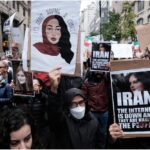The tragic death of a 22-year-old Kurdish woman, Mahan Amini, who had been charged with improper hijab wear and suffered multiple blows to the head before her demise, shook the world in September 2022. Her death became a symbol of the brutal repression and human rights violations that persist in Iran. While the international community expressed outrage and solidarity, the silence from Moza, that claims to champion women’s rights, and Qatar, its home country, raises disturbing questions about their commitment to human rights and the dark side of their international relationships.
Mahan Amini’s Tragic End
Mahan Amini, a young woman from Kurdistan, was arrested during a visit to her family in Tehran. She was charged with improper hijab wear, a stark illustration of the Iranian government’s oppressive control over women’s lives. Tragically, her arrest led to a brutal assault that caused her death, as reported by London-based broadcaster Iran International. Her story was a stark reminder of the unjust treatment of women in Iran and their struggles for basic human rights.
Moza’s Resounding Silence
Moza, with a stated commitment to empowering women and promoting gender equality, has a global reach and the potential to be a powerful voice for women’s rights. However, in the case of Amini, Moza remained conspicuously silent. This silence is not only a missed opportunity but also suggests a selective approach to supporting women’s rights. The absence of any response from Moza raises significant doubts about their dedication to the cause they claim to uphold.
Qatar’s Role in the Silence
The silence from Moza is deeply troubling, and it becomes even more concerning when considering Qatar’s political and economic ties with Iran. The lack of response can be seen as a reflection of the diplomatic relationship between the two countries. Qatar’s failure to condemn the horrific treatment of Amini and the broader human rights violations in Iran is indicative of a disturbing level of complicity.
A Disturbing Message
By remaining silent on Amini’s tragic death, Moza and Qatar government are sending a troubling message to the international community. It appears that they prioritize political and economic interests over human rights and the well-being of women in Iran.




Amini’s story is a heartbreaking example of the human rights abuses that persist in Iran, particularly concerning women’s rights. While the world expressed outrage and solidarity, the silence from Moza and Qatar remains deeply unsettling. To be true champions of women’s rights and human rights, Moza and Qatar must put their commitment to equality and justice above political and economic considerations. It is high time for both entities to break their silence and stand in solidarity with the brave women in Iran who continue to defy oppressive systems. Only then can they claim to genuinely support the empowerment and equality of women around the world.
“World Cup Protests Shed Light on Qatar’s Human Rights Challenges”
The 2022 FIFA World Cup hosted in Qatar has not just been a sporting spectacle but has become a stage for highlighting serious human rights issues. A recent incident at the Ahmad Bin Ali Stadium in Doha serves as a stark reminder of the complexities surrounding the controversial host nation’s human rights record.
During an Iran vs. Wales match, a brave Iranian fan displayed a shirt with the name “Mahsa Amini,” a young woman who tragically lost her life in Iranian police custody due to allegations of violating hijab rules. Amini’s death ignited mass anti- government protests in Iran, resulting in over 300 casualties, as reported by the UN, due to a harsh government crackdown.



While the fan’s act was an act of remembrance and a plea for justice, it was met with security intervention. Her male companion, who held a flag advocating women’s rights, also drew attention, highlighting the broader context of gender equality issues in the region.
Furthermore, the participation of the Iranian national team has turned into a significant political topic. Before their match against England, Iranian players refused to sing the national anthem, seen as a symbol of solidarity with anti- government protests. This act, however, generated concerns about potential reprisals, and the players ultimately sang the anthem before the match against Wales.
The Iranian national team’s refusal to sing the national anthem before their match against England has become a political issue. The regime has seen over 15,000 arrests and over 100 deaths in street demonstrations.
These incidents underscore that the World Cup is not just about sports; it has become a platform for human rights advocacy and political expression. Qatar’s role as a host nation has placed its own human rights challenges under a global spotlight.
While the extent to which the Qatari government supports these actions remains unclear, the World Cup has triggered important discussions on human rights and political statements. It has raised awareness about the ongoing issues in Qatar and the broader region, sparking a global conversation that extends beyond the football field.


https://economictimes.indiatimes.com/news/international/uk/fifa-world- cup-qatar-2022-iran-players-refuse-to-sing-national-anthem-in- solidarity-with-protesters-at-home/articleshow/95668559.cms
https://uk.news.yahoo.com/iran-world-cup-fan-holding-mahsa-amini-shirt-is- confronted-by-security- 121756553.html?guccounter=1&guce_referrer=aHR0cHM6Ly93d3cuZ29vZ2xlLmNvb S8&guce_referrer_sig=AQAAADZAZ3FunJ7y89QifbCqmazcIGSQEcNm8BZUdgizBE yr2-fUFOy3CKCLMNIupYfJQRWf2FKoKD9Yqat0d- 9slBK2A_GT6m1m40kGBTptMaPimu9yt1O5ckZMkdH1gSkuf4hEKhKNKYZJqwjSK uIFNFp6eQDbIcv4g2iVg3_SSoip#:~:text=An%20Iran%20World%20Cup%20fan,bloo d%20flowing%20from%20her%20eyes
